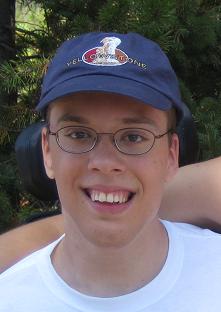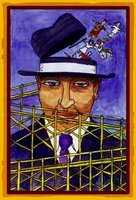I'll Do It Myself
"Speech therapy seemed rather bizarre to me. The therapist sat on a floor mat, with me lying on my back between her outstretched legs. My legs wrapped around her waist and her stinky toes in close proximity to my nose. She then proceeded to stick her fingers in my mouth to wiggle my lips, supposedly to loosen them. She alternated between her fingers and ice cubes. Then, for the actual speaking exercise, she pushed on my chest in attempts to improve my breathing capacity. After all those years of this hefty woman pushing down on my chest, I am convinced that was why I was such a late bloomer.
The thing that puzzled me, as I laid there on my back staring at the ceiling tiles, was what was I suppose to do when I met people outside as I got older? Was I to lay down on my back, on the floor, before speaking to them? I envisioned myself sprawled out on the ground when meeting a friend at the shopping mall or grocery store. Definitely not a dignified thought. Perhaps not surprisingly, pillow talk is some of my clearest speech!
…
After the speech therapist with stinky toes, I had one for a brief time who had me sit up for the entire session. What a concept! One of the most sensible things we did was make an alphabet card, small enough to carry with me, that I could use when people didn’t understand what I was saying. I simply spelled out the word on the card. Sometimes the low-tech solution works the best. I’ve had many variations of that card through the years."
This is an excerpt from Glenda Watson Hyatt’s book, I'll Do It Myself. Glenda is from Surrey, British Columbia. She has been a vocational and career counselor and also a web accessibility designer. Glenda has wanted to write her autobiography since she was 10 years old. And she finally did it! She is now on a whirlwind virtual book tour of 40 blogs in 40 days.
I asked Glenda about her writing and her life.
1. Why did you write your book? What do you hope people will take away from it?
I wrote my autobiography I’ll Do It Myself as part of my legacy, as my way of passing on the lessons I’ve learned in hopes of making someone else’s life easier, as my way of showing that having cerebral palsy is not a death sentence, but rather a life sentence.
First, and foremost, I wrote I’ll Do It Myself for youth and young adults with cerebral palsy and other disabilities to motivate, to inspire and to share how I have navigated life. Sometimes simply reading how someone else handled a particular situation gives the reader the encouragement and ideas for handling a similar situation. Other times knowing others have had similar experiences – to know one is not alone – can be so comforting, and can offer strength and hope.
Secondly, I also wrote the book for parents, who, after having their bundle of joy gently placed in their awaiting arms, are given the devastating news their baby has cerebral palsy. In an instant, their hopes and dreams for their child, as well as for their family, are smashed. I hope this book offers a glimmer of hope for these parents, as well as for the siblings, grandparents, aunts and uncles. I want to show that life can still be meaningful, despite cerebral palsy. I hope the book offers parents insights and ideas when raising a child with cp; however, realizing that no two children with cp are the same, there is no guarantee these ideas will be appropriate for every child.
2. In his memoir, Planet of the Blind, Steve Kuusisto talks about learning to “walk upright” –accepting his disability while recognizing that he is not defined by it and living a full life. Do you have any transformational experiences that you can share?
Due to my cerebral palsy I have a significant speech impairment; I speak Glenda-ish, which few people take the time to understand. Medical experts have labeled me as “functionally non-verbal” – a label that my husband vehemently disagrees with.
A couple of years ago I was asked to give a brief speech. Because of my speech, my initial reaction was “No, I can’t.” But, being raised without the word can’t allowed in my vocabulary, that was a fleeing thought. My mind then turned to how can I do this.
Using a text-to-speech software loaded onto my laptop, I was able to give my first ever speech. It was amazing! At a later event, using my synthesized voice on my laptop and my pre-canned comments, I actually put up my hand to say something for the first time in my life!
Now, with similar text-to-mp3 technology, now I can even podcast! This non-verbal red-head is podcasting! I feel like a butterfly, emerging from my cocoon of silence. I can now reach people in a new way, and who knows what opportunities will arise now that I can podcast!
I no longer consider myself non-verbal; instead, I have a significant speech impairment. This has been an empowering experience as I try on words that better describe and define me, rather than being burden with labels imposed upon me by medical professionals or strangers. It will continue to be a journey, a process, as I transition from being non-verbal to speech impaired. This will likely mean taking steps, even baby steps, as I take on this new role.
3. What advice do you have for someone like me, a young person with a disability planning his future?
David, I would say hold on to your dreams. You will, no doubt, have parents, instructors, employment counsellors, vocational rehab workers and countless others offering advice on what you should do with your life; some may even strongly encourage you to go in a particular direction. Openly listen to their advice, even explore the various options suggested. But, in the end, it is your life, your choice. Pay attention to your interests, your values, your passions, your dreams. Choose what feels right to you (with a dose of reality) and then go for it. The future is yours!
4. What’s next for you?
Since my book I’ll Do It Myself began as a dream when I was ten and has taken me thirty years to get to this point, I’m going to do all I can to promote it. Next quarter, I’m planning to do a Flash movie using childhood photos to put up on YouTube, to do some video viral marketing. First I need to learn enough Flash to be able to put my idea into action. I’m also planning to develop an e-course “Accessibility in Action”. Over the years, I have found that people have fears when interacting with those with disabilities because they simply don’t know what to do and they are too embarrassed to ask. I want to address those fears by providing practical information and a safe place to ask questions. The e-course would include topics like what language to use when referring to people with disabilities, tips for when communicating with people with disabilities, ideas for when choosing a gift for a relative/friend/colleague with a disability, suggestions for how to include a classmate with a disability at your child’s birthday party, and many other topics. My goal is to include hands-on and practical information that people can use in everyday life. Meanwhile, I will wait for the seed of my next big dream to be planted. Perhaps it will be a movie based upon I’ll Do It Myself!
You can learn more about Glenda and join her for the rest of the virtual book tour here. If you'd like, you can sign up there to receive blog updates, or to order a copy of her book.
Glenda, thank you so much for taking the time to share some of your thoughts. Best of luck on your book tour.











5 comments:
David,
Thank you so much for hosting today's appearance of my virtual book tour. I enjoyed it.
Once this tour is done (and before I start the next one), I'd love to interview you on my blog to discuss the obstacles young people with disabilities are facing nowadays. I wonder how much things have changed since I was young -- and now I'm feeling old!
Wishing you all the best, David! You'll go far.
"people have fears when interacting with those with disabilities because they simply don’t know what to do and they are too embarrassed to ask."
I think this is a good phenomenon to address, and it reminded me that I have seen a guy called CoquiDave on YouTube and LiveVideo (I noticed him his responses to SilentMiaow's videos) addressing just this topic in his videopostings. Don't know if you were looking for collaborators, but I wanted to recommend his videos, because he has a very personable way of explaining things.
hello. i was doing some research for a thesis i have to do and i came across this. i'm 15 and i have cerebral palsy. yeah, i can relate alot:) i also really wanna be a writer...like glenda! :) i am happy to have come across this blog. :)
Hi:) my comment is to the previous anonymous - do you have your own blog? I have my site and now I've created my network(http://amonetwork.ning.com/) - you can join it and create your own page there and also i can post some of your stories on my site;) Good luck to you and take care!
I can really relate to Glenda because I'm 17 and have CP. I plan to write a book also. She is totally right on about stuff.
Post a Comment